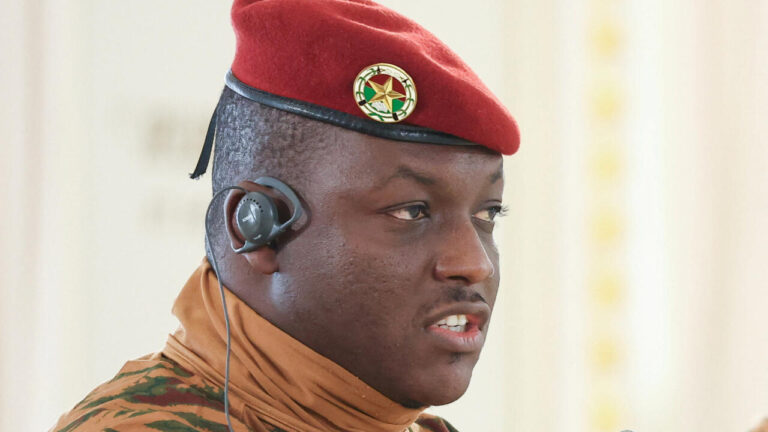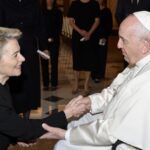Burkina Faso, already reeling from political instability and escalating jihadist violence, is showing early signs of another potential coup. Since 2022, the West African nation has experienced two military takeovers, and the current junta led by Captain Ibrahim Traoré now faces growing internal discontent, external pressure, and a deteriorating security environment regional stability.
II. Signs of Coup Risk in Burkina Faso
1. Fracturing Within the Military
- Recent reports point to internal rivalries among military factions, especially between those loyal to Traoré and officers feeling marginalized.
- Junior officers and paramilitary elements, often the driving force behind past coups in the Sahel, are expressing disillusionment with stalled progress against insurgents.
- Rumors of secret detentions, purges, and disputes over control of key bases in the north and east suggest a tense atmosphere within the armed forces.
2. Escalating Insurgency and Popular Disillusionment
- Jihadist attacks continue unabated despite promises of security reforms.
- Over half the country’s territory is under partial or full insurgent control.
- Traoré’s popular support is fading, particularly in urban areas where fuel shortages, inflation, and displacement are worsening.
- Civilian self-defense groups (VDPs), empowered by the regime, may challenge state authority if they feel abandoned or unsupported.
3. Anti-French, Pro-Russian Sentiment and Regional Blowback
- The regime has increasingly aligned itself with Russia and the Wagner-affiliated Africa Corps, mirroring Mali and Niger.
- The pivot has led to diplomatic isolation from ECOWAS, the EU, and France, increasing the regime’s dependency on a narrow range of external backers.
- This strategic realignment has created enemies inside and outside the state, especially among elites who fear international sanctions and loss of economic aid.
III. International Influence: Enablers and Triggers
1. Russian Influence: Protection or Provocation?
- Traoré’s government has welcomed Russian military trainers, drones, and advisors.
- Russia’s presence, while bolstering short-term regime survival, may also trigger backlash from:
- Burkinabé officers who favor traditional Western partnerships.
- Regional neighbors who view Moscow’s role as destabilizing.
- A pro-Russian faction may try to consolidate power through a coup—or an anti-Russian faction could strike first to realign the country diplomatically.
2. ECOWAS and African Union Constraints
- Burkina Faso’s junta faces diplomatic isolation and suspended ECOWAS membership.
- Sanctions have not been imposed as harshly as on Niger, but another coup could provoke stronger regional penalties.
- The African Union, under growing Western and domestic pressure, may be forced to adopt a firmer stance if the constitutional order is again disrupted.
3. France and the West: Irrelevance or Return?
- France’s military and diplomatic withdrawal has created a vacuum, but Paris retains deep intelligence networksand economic ties in Burkina Faso.
- A power struggle within the junta could see pro-Western factions attempting to reengage France or the U.S., especially if Russia fails to deliver tangible security results.
IV. Consequences of Another Coup
1. Deepening Instability and State Fragmentation
- A new coup could weaken the state’s already fragile institutions, undermining central command over security forces and civil administration.
- Risk of splinter groups forming armed factions or taking control of regional command centers increases.
2. Humanitarian Crisis and Mass Displacement
- A government collapse or civil-military confrontation would likely accelerate:
- Internal displacement, already at over 2 million people.
- Disruption of humanitarian aid corridors.
- Increase in cross-border refugee flows into Ghana, Côte d’Ivoire, and Togo.
3. Regional Contagion and the Sahel Crisis
- Another coup would complete the military bloc now spanning Mali, Burkina Faso, and Niger.
- This bloc could act as a counterweight to ECOWAS, potentially forming a pro-Russia alliance hostile to Western norms of democracy and governance.
- It could also trigger preemptive military or political moves in Guinea and Chad, countries already under transitional regimes.
V. Outlook: Is a Coup Inevitable?
While not guaranteed, Burkina Faso exhibits multiple classic “pre-coup indicators”:
- Military dissatisfaction
- Erosion of public support
- Rising external pressure
- Lack of clear succession or civilian oversight
The presence of international actors—Russia on one hand, and a watchful West on the other—adds geopolitical tensionto the mix. The situation remains fluid, but unless Captain Traoré recalibrates quickly, the risk of a palace coup, mutiny, or forced transition is high in the next 6–12 months.
Burkina Faso stands at the edge of another political rupture. The signs of internal fragmentation, coupled with complex international dynamics, suggest that the current regime’s survival is far from guaranteed. The consequences of a coup would resonate beyond Ouagadougou—further destabilizing the Sahel, challenging Western influence, and possibly cementing a new, militarized axis of Russian-aligned regimes in West Africa. Whether through diplomacy, force, or default, the next chapter in Burkina Faso’s crisis will have regional and global implications.
real-time indicators
to assess whether a coup is imminent in Burkina Faso. These signs are grounded in previous coup patterns in the Sahel and across West Africa, and they can offer early warning of a political rupture:
🔍 Real-Time Coup Indicators in Burkina Faso
1. Unusual Military Movements

- Deployment of elite units (especially the RSP remnants or presidential guard) into Ouagadougou without explanation.
- Increased activity at Camp Guillaume or other strategic military bases.
- Troop or armored vehicle presence near key locations: presidential palace, national TV/radio, airport.
2. Media Disruption or Information Control
- Interruption or blackouts of RTB (Radiodiffusion Télévision du Burkina).
- Social media slowdowns or internet blackouts, especially in the capital.
- Surge in pro-coup or anti-Traoré narratives on Telegram, Facebook, or X (formerly Twitter), particularly from military-linked accounts.
3. Internal Regime Fractures
- Sudden arrest, disappearance, or “retirement” of senior officers.
- Leaks or whistleblower reports of tensions within the junta.
- Dismissals or reshuffling of key ministers or military commanders—especially those in charge of defense or intelligence.
4. Civilian Unrest or Anti-Government Protests
- Mass mobilization of unofficial militias or self-defense groups (VDPs).
- Demonstrations demanding better security or food access that are not immediately repressed.
- Strikes or disruptions by civil servants, teachers, or unions—indicating a breakdown in control.
5. Diplomatic and Foreign Presence Shifts
- Closure or scaling down of foreign embassies (especially France, EU, ECOWAS).
- Russian military convoys or new equipment deliveries—especially outside official channels.
- Suspension or reallocation of UN, WFP, or humanitarian agency operations due to “security concerns.”
6. Intelligence & Insider Reporting
- Sahel-focused media (like Radio Omega, Jeune Afrique, or Wakat Séra) publishing reports of army discontent or power struggles.
- Increased presence of anonymous military sources in foreign media hinting at “solutions being considered.”
- Intelligence leaks or U.S./French advisory notes warning of political instability.Historical Coup Culture and Military Legitimacy in Burkina Faso
Burkina Faso has experienced multiple coups since independence in 1960. The military often positions itself as the protector of national sovereignty, especially when civilian governments—or rival juntas—lose legitimacy.
Consider referencing the 1983 coup by Thomas Sankara and how military-led nationalism is rooted in Burkinabè political identity.
The 2022 coups (in January and September) can be analyzed as part of a pattern of military interventionism when the civilian or transitional leadership is perceived as ineffective against jihadist threats.
2. Role of Youth and Urban Populations
Traoré rose to power on a wave of youth support, branding himself as a revolutionary figure. That support is starting to fracture, especially in Ouagadougou.
Rising youth unemployment, internet repression, and food inflation are creating a new layer of frustration that could serve as a mobilizing force—either for protests or to legitimize a coup by another faction.
3. Wagner Group and Russian Private Military Companies (PMCs)
Include a closer look at how the Africa Corps (successor to Wagner) operates in Burkina Faso:
Security of key installations (mines, airports, government buildings).
Potential involvement in internal repression or factional protection.
Their presence may deter some coup attempts but also deepen internal divisions—especially if some officers feel sovereignty is being outsourced to Russia
4. Informal Power Structures and Ethnic Dynamics
Burkina Faso’s elite military leadership is not monolithic. There are reported tensions between officers of Mossi, Gourmantché, and Fulani backgrounds.
Certain coups in Africa have succeeded because of ethnic marginalization within the officer corps—this is a subtle but powerful indicator of internal fragmentation.
5. Economic Collapse and Mining Sector Politics
Burkina Faso’s gold mining industry (formal and artisanal) is a strategic target for both jihadists and military elites.
Traoré’s attempt to “nationalize” parts of the sector and bring Russian contractors in has alienated foreign investors and some military commanders with stakes in the trade.
A coup could be partly driven by elite economic interests, especially if these profits are seen as threatened.
6. Potential Role of External Spoilers
Consider how Algeria, Libya, and Turkey may influence Burkina Faso’s trajectory:
Algeria has been wary of Russian expansion and may exert pressure through ECOWAS.
Turkey has expanded its presence via arms sales and soft power (mosques, education).
These non-Western, non-Russian actors may align with either pro- or anti-junta factions behind the scenes.
7. Lessons from Neighboring Coups
Compare Burkina Faso’s trajectory with Mali and Niger:
Mali’s Assimi Goïta has consolidated power with Russian backing but struggles with legitimacy.
Niger’s junta is under harsh sanctions, yet survives due to internal military unity.
The fate of coups in neighboring countries provides both inspiration and cautionary lessons for officers in Burkina Faso.
Optional Add-ons:
Map:
Timeline:
Matrix:
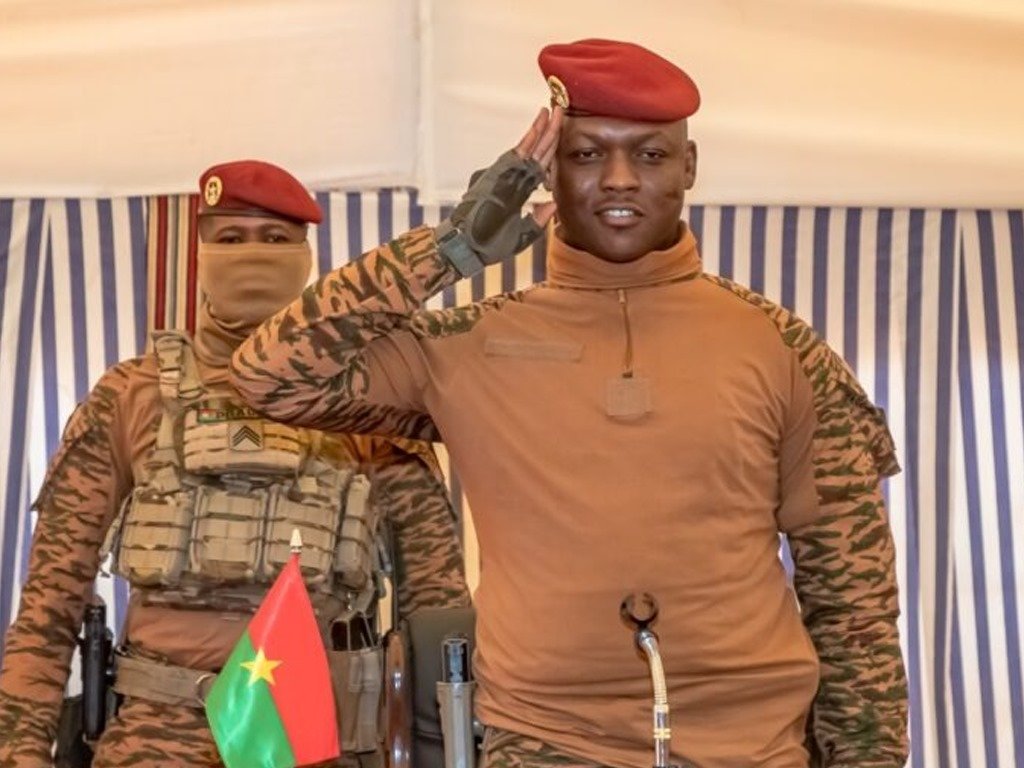
More on this story: Ibrahim Traoré, Russian Influence, and U.S. Policy Challenges

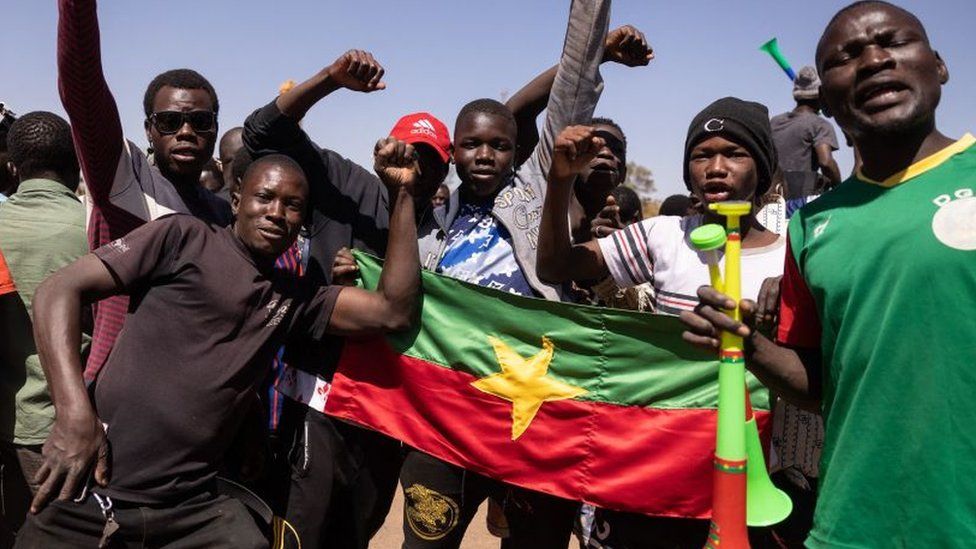
More on this story: Burkina Faso: yet another military coup – a void for Russia to fill
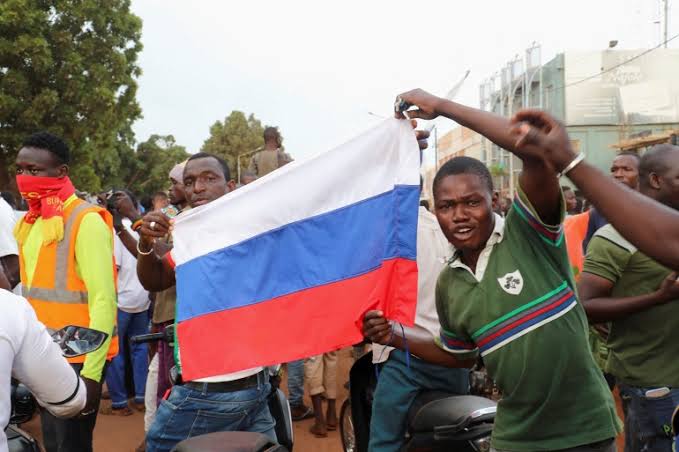
More on this story: Russia benefits from military coup in Burkina Faso


